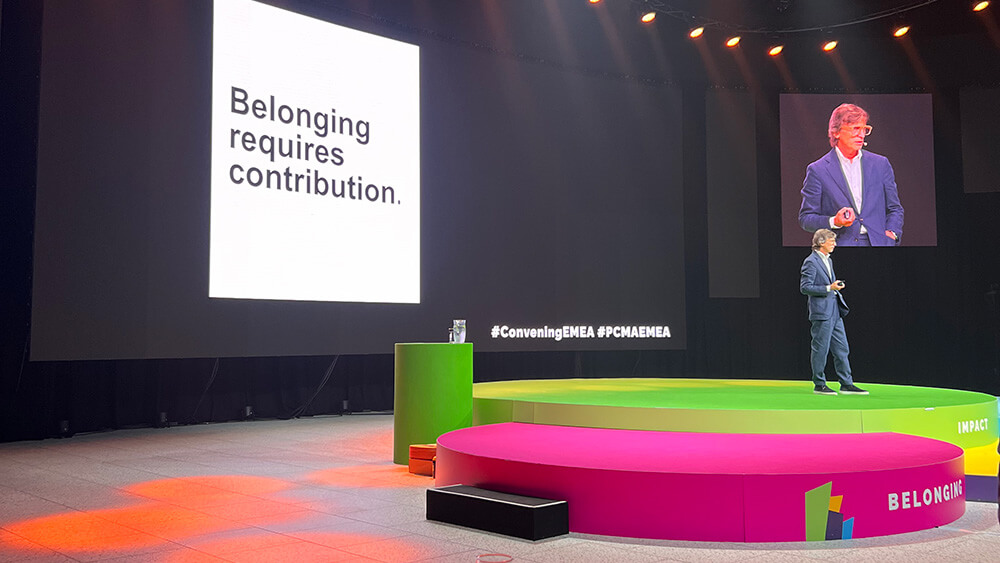
Philip Davies, Siegel+Gale’s president of EMEA, talked about simplicity in branding at PCMA’s Convening EMEA.
Branding is just as important for events as it is for consumer products companies. Since many conferences and conventions are competing for audiences, they need to establish a brand identity that stands out. This is not only true for sectors like health care and tech, but niche events as well, because they compete with other channels, like online communities, that offer alternatives for their audience to connect and learn.
In a complex and noisy world, brands that make their mark in the world embrace one thing: simplicity. That was the main theme of Philip Davies’ keynote session, “When Belonging Is Complicated, Simple Is Smart,” at PCMA’s Convening EMEA in Copenhagen, Sept. 20-22. Two quotes about branding that Davies, who is president of EMEA for brand strategy and design company Siegel+Gale, shared in his talk underscore why an event — not just a consumer products company or retailer — needs to focus on making an impression on the audience:
“Products are made in the factory; brand is made in the mind.”
“Brand is what people say about you when you leave the room.”
Davies said that people’s top two fears are 1) not having control over the outcome of future events and 2) being alone. A brand can help with the latter fear by making people feel like they belong to a tribe or a community, a culture, or a company. Music, entertainment, and sports really pull people together, he said, “and you feel you get something tribal there and people feel like they really belong to something extraordinary.”
Brands have a role to play, Davies said, that was “previously occupied by patriotism, family, and friends, even. As human beings, we are programmed to feel that we want to belong to things.” Which also happens to be the power of gathering people together around a common cause or goal.
Davies shared how the NBA logo — the silhouette of a basketball player — “shows the power of a single identity,” he said. “It is universal, it has broad appeal, it’s enduring — it’s lasted for 53 years — and it’s scalable. It can go many places.”
To get to that degree of simplicity requires a lot of work, he said. “When it comes to trying to assemble a group or a brand, you need to give [people] something that becomes natural, something they don’t have to think about.”
This year, Siegel+Gale worked on the identity for the U.S. Army, he said, to try to attract Gen Z by conveying to them that there is something good about wanting to be a part of the U.S. Army. “We explored the zones of passion and purpose and the idea of community and connection, making them feel that they could really belong to something powerful, based on one simple idea around ‘possibilities.’ We often look for one word. Can we compress this business, this organization, this entity into just one word? For ourselves [i.e., Siegel+Gale], we do it with the word ‘simplicity.’
“For the U.S. Army, it was ‘possibilities.’ We then looked at what the tagline could be for that. We didn’t have to look very far because they had it: We brought back a line that had been used in the ‘80s — ‘Be all you can be’ became the resurrected tagline for them. Gen Z had never heard of it, but it spoke to their values, exactly what they wanted to hear.”
‘Belonging Requires Contribution’
Central to the messaging for the U.S. Army is the belief that belonging requires contribution, Davies said. “It’s not about just blending in or fitting in. It’s about actively contributing. It’s not a passive endeavor being part of something if you are to make it work and make it valuable. The value is in what you bring, not in how you fit in. It’s a massive distinction and simplicity can really be a powerful ally to that.”
Simplicity, Davies said, “is about absolute focus. It’s about what’s the most important thing you can say.” While that may sound like it would require reductionism, he said it’s not that. Instead, it’s about “compression and focus.” In some ways, he added, it’s like wearing noise-cancelling headphones. And simplicity in a brand is not just how you communicate, he said, “it’s also how you operate.”
For the past 10 years, Siegel+Gale has annually published two lists: the top 10 simplest brands in the world and in the U.S. by fielding a survey to determine which brands and industries simplify people’s lives. The company’s definition of simplicity is based on these attributes: easy to understand, transparent and honest, caring for and meeting consumer needs, innovative and fresh, and useful.
Sounds like a good lens to simplify an event’s identity.
World’s Simplest Brands
This year’s lists were just published. Here they are:
Global Top 10
- Lidl
- Amazon
- Aldi
- Samsung
- 7-Eleven
- McDonalds
- Uniqlo
- FamilyMart
- Burger King
U.S. Top 10
- Whole Foods
- United States Post Office
- Lyft
- UPS
- Burger King
- Dunkin’
- Trader Joe’s
- Amazon
- Old Navy
Michelle Russell is editor in chief of Convene.
